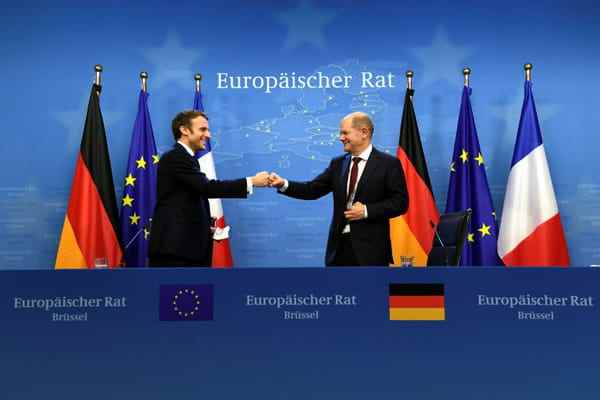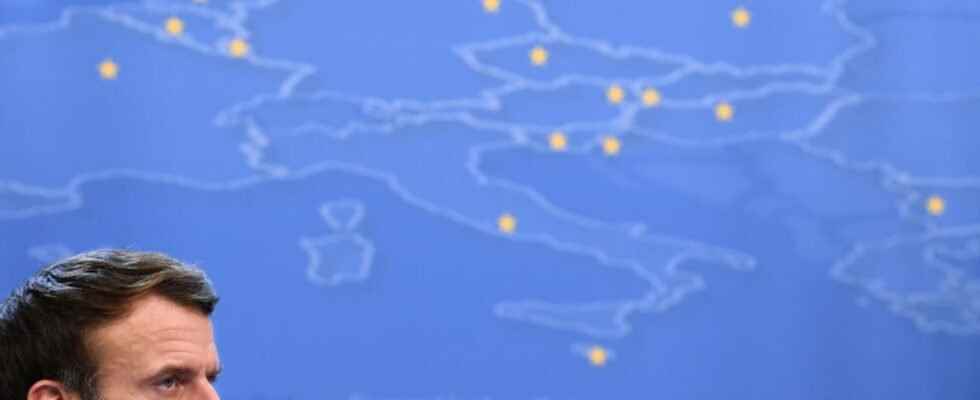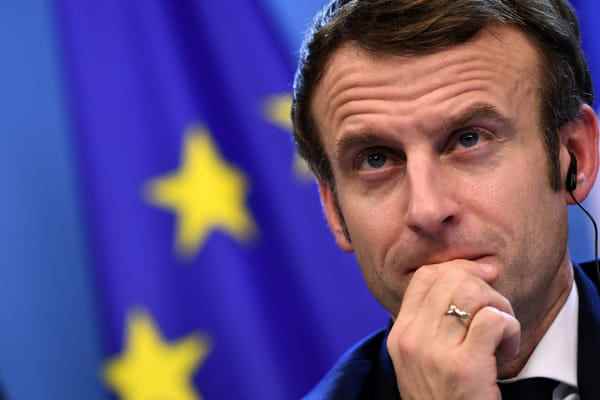France took the rotating presidency of the European Union for six months on Saturday with an ambitious program, that of a “powerful” and “sovereign” Europe, which however risks being jostled by the new outbreak of Covid-19 and the April presidential election.
At midnight (11 p.m. GMT Friday), she took over from Slovenia, which had chaired the Council of the EU since July 1, and will give way to the Czech Republic in the second half of the year.
Symbol of this relay, the Eiffel Tower and the Elysée Palace were illuminated at the same time in blue, the color of Europe.
But the installation of the European flag under the Arc de Triomphe in Paris has also sparked a controversy.
Far-right presidential candidates Marine Le Pen and Eric Zemmour said they were “outraged” that the French flag had been replaced by that of the EU “above the tomb of the unknown soldier”.
“The French flag will obviously be reinstalled”, replied the Secretary of State for European Affairs, Clément Beaune, denouncing “sterile controversies”.
The Council of the EU represents the interests of the 27 member states vis-à-vis the Commission and the European Parliament. The six-monthly presidency convenes meetings of ministers, sets the agenda and conducts negotiations.
– Berlin at the rendezvous –
For six months, France will therefore have a significant power of influence to advance certain subjects and find compromises at 27 even if the exercise, very supervised, involves neutrality and tact.
President Emmanuel Macron has set the bar very high: “2022 must be the year of a European turning point”, he said during his New Year’s greetings.
It is about making “Europe powerful in the world, fully sovereign, free of its choices and master of its destiny”, he explained on December 9.
Ambitions that he has continued to display since his election in 2017, not without straining some of his partners, especially Eastern Europeans.
He himself will not chair the summits of Heads of State and Government or European Councils – a role devolved on the Belgian Charles Michel – but he will be able to influence the discussions and intervene in the event of a crisis.
However, the EU is at a crossroads on a series of subjects, from security in Europe – tens of thousands of Russian soldiers are massed at the gates of Ukraine – to the health crisis which again obscures the horizon economic.

French President Emmanuel Macron and German Chancellor Olaf Scholz at the European Union summit in Brussels on December 17, 2021
© POOL – JOHN THYS
Emmanuel Macron can count on the support of the new German chancellor, the social democrat Olaf Scholz, who will chair the G7 in 2022 and also pleads for a “more sovereign and stronger Europe”.
“Together, we will work for a more digital, ecological and social Europe, whose voice carries high in the world”, also tweeted Saturday the President of the European Commission, Ursula von der Leyen.
– “An asset and a risk” –
The French Presidency of the European Union (PFUE) has set itself three priority areas: the establishment of minimum wages throughout the EU, the regulation of digital giants and the creation of a carbon tax on products imported into Europe according to their environmental impact.
Emmanuel Macron also advocates a reform of the Schengen area in order to better “protect the European borders” in the face of migratory crises, a subject which will be at the heart of the French presidential campaign.
He also intends to put on the table a revision of the budgetary rules – the famous Maastricht criteria – which frame European deficits, in order to be able to finance more European investments and growth.
And continue to advance Europe in defense, despite the reluctance of certain partners attached above all to the protection of NATO.
This is the 13th rotating biannual presidency held by France since 1958.
The presidential election in May and the legislative elections in France in June, however, will hit it head-on, reducing the space of time to act.
The surge of the Omicron variant will also upset the agenda, at least in January when many meetings will be left behind.
The opposition denounces an instrumentalization of the “PFUE” by Emmanuel Macron, very likely candidate for his re-election even if he has so far refrained from any announcement.
“It can be an asset for the French president (..) but also a risk” if his political opponents choose to attack him head-on on his European policy, summarizes Thierry Chopin, professor of political science at the Catholic University of Lille (North).
All rights of reproduction and representation reserved. © (2022) Agence France-Presse

